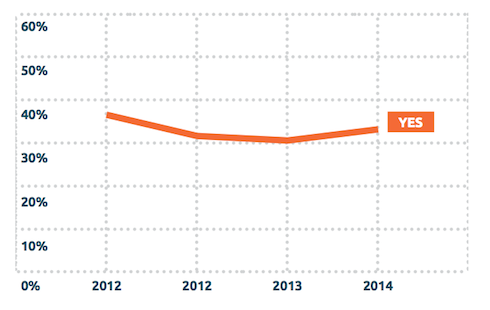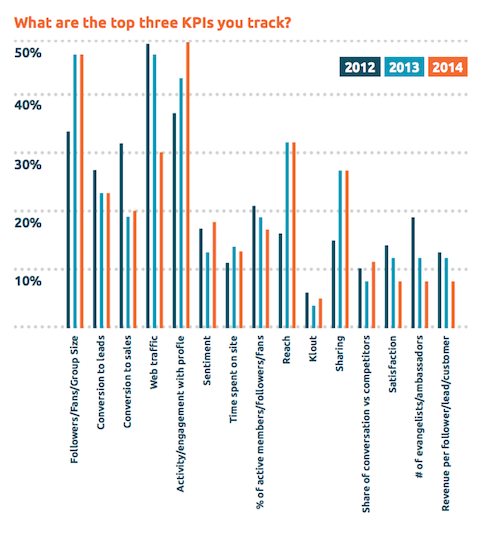By adaptive - August 19th, 2014
In the last of our series covering the results of this year’s State of Corporate Social Media report, we consider the impact that social media is having across the corporate landscape.
Social is taking more of an important role within the marketing activity of the corporations that responded to this year’s survey. Over 60% reported that they believe that social media is integrated tightly enough into their marketing strategy, with 57% of B2B only corporations responding positively to this question.
However, again, it seems that even though these businesses feel they are doing enough with their activity across the social space, they still find it difficult to report actual gains from these channels. And 55% of all respondents state that social media isn’t tightly enough integrated with boarder businesses practices. The figure in the B2B sector is worse at 63%. Corporations still have some way to go with their social media use maturity.
It is telling that nearly 70% of respondents do not have an integrated CRM system. Some 67% of B2B corporations also report not using a CRM with the figure for corporations in the B2C sector being 78%. In addition, over 80% of all respondents also stated they didn’t feel they were fully leveraging the power that social media could deliver to their corporations. The figure for B2B organisations is 84.5% and for B2C the figure is almost (84.3%) identical illustrating that there is still masses of room for corporations to develop their use of social media right across their organisations.
Last year we reported that 31% of respondents felt they were accurately measuring the impact social media was having on their companies. This year’s figure has jumped by 5%, which does show a marked improvement, but still means 65% still feel they can’t accurately measure their corporation’s social media activity. A similar number (66%) in the B2B feel they don’t accurately measure the impact that their social media activity has, with 65% in the B2C sector also stating they have issues in this area.
In addition, we do see an even split between those respondents that state they can measure social media ROI and those that can’t. Just over 47% of respondents stated that social media drives sales across their businesses. Just under 53% stated no or don’t know.
And in the B2B sector 46% state they can measure ROI, but over a third (33.7%) state they don’t know if social media activity actually drives sales across their corporations. In the B2C sector 48% state they can measure ROI, with 47% stating that social media activity does drive sales. However, over a third (32%) still don’t know if this is the case.
There is clearly some work still to be done in how social media activity is measured and related to commercial activity across the corporate landscape.
New metrics are needed
One of the most telling results from our research over the last few years is how corporations use KPIs to track the impact that social media is having on their businesses.
Last year’s report concluded that reporting web traffic was the most used KPI for our respondents. This year we have in fact seen an increase in their number from 44% last year to nearly 48% this year.
Also, reporting on follower numbers is also up from 44% to 46.9% with activity/engagement also showing an increase from 43% to 45.3% this year.
There is a similar picture in the B2B sector with 52.8% of respondents stating they used web traffic as their primary KPI, with followers being used by 44% of B2B corporations. The corresponding figures for the B2C sector are: 40% and 41% respectively.
However, as we stated in last year’s report, we continue to feel that corporations are being too simplistic in their approach to how they measure social media activity. The fact that follower numbers continues to be the main KPI used is unfortunate and belies a continued misunderstanding of the importance that sentiment and sharing now have on the commercial aspects of the social media space.
Conversion to leads or sales as a metric also continues to be high at 26.4% and 21.9% respectively with corporations attempting to develop these KPIs in the context of their social media activity.
And depressingly, the number of brand evangelists or ambassadors used for analytics has remained low at below 10% with share of conversation actually reducing. The picture is slightly different in the B2B sector with 34% of respondents using conversion to leads and sales (21%) as KPIs across their businesses.
Key findings
This lack of a deep understanding of how social media impacts on corporations is worrying. The focus for the metrics that are being used lacks the depth of understanding that is needed, as at the moment, KPIs and other metrics make simple correlations between follower numbers and the conversion into leads or sales. KPIs in the age of social media are much more subtle and are a multifaceted.
Download the full The State of Corporate Social Media Briefing 2014.
Next Reads
November 2014, New York
The Social Media for Customer Service Summit is your one-stop-shop for all the latest social media insight and best practice. It gives you a 360 degree look into building, operationalizing and initiating a successful social media strategy at your company
Brochure Programme

